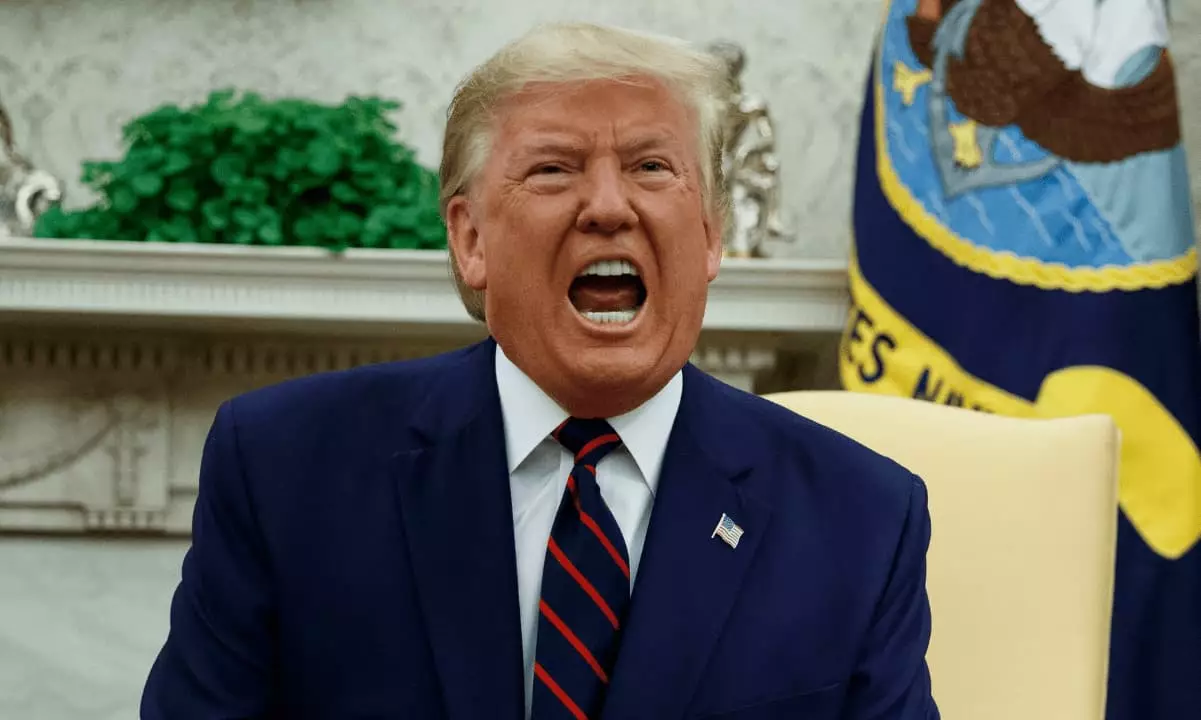The recent inquiry into President Donald Trump’s cryptocurrency endeavors is raising significant questions about the very foundations of political fundraising in America. A group of senior House Democrats has taken the initiative, asserting that Trump’s activities, particularly with the fundraising platform WinRed and various political action committees, are potentially marred by illegal practices that could undermine the sanctity of our political system. While on the surface, this inquiry may seem like a partisan attack, at the heart of it lies a matter of ethical governance that should concern all citizens, regardless of their political persuasion.
One cannot help but scrutinize the motivations behind these allegations. Are the Democrats truly concerned about the integrity of our electoral system, or are they engaging in a game of political chess aimed at undermining Trump’s influence? Either way, the inquiry will shine a light on the murky waters of political finance, revealing whether it is more about regulation or retribution in a hyper-polarized environment.
Meme Coins and Malfeasance
The specifics of the inquiry delve into extraordinarily bizarre territory—a universe where meme coins like the TRUMP and MELANIA tokens reign supreme. Reports suggest that entities associated with Trump hold a staggering 80% of these coins, raising eyebrows and questions about possible insider trading and pump-and-dump schemes. It is easy to scoff at the idea of politicians dabbling in the volatile world of cryptocurrencies. Yet, when substantial financial interests are involved, the implications become much more serious.
The emergence of these tokens marks an unsettling trend in political fundraising—transforming what was once a dignified means of garnering support into a platform for potential exploitation. The meteoric rise and fall of wealth in these speculative instruments are particularly disconcerting. The allegation that early investors, some rumored to be foreign nationals, profited significantly while later investors suffered dire losses points to a blatant disregard for financial ethics within the very institutions designed to uphold them.
Potential Foreign Influence at Play
As if the mere existence of these questionable fundraising methods weren’t alarming enough, the specter of foreign influence further complicates the situation. The anonymity inherent in cryptocurrency transactions can easily facilitate foreign actors’ involvement in U.S. political matters. The House Democrats have flagged this as a national security concern, implying that foreign investors could gain a foothold in influencing American policy decisions.
In this context, one has to wonder: Is the concern over foreign influence genuinely about safeguarding our democracy, or merely a strategic maneuver to discredit a political opponent? It’s a gray area, but for a politician like Trump who has routinely embraced controversy, it raises crucial questions that can no longer be ignored.
Ethics and the Presidency: A Dangerous Blend
Adding another layer of complexity to the inquiry are Trump’s business ventures intertwining with his presidential responsibilities. The planned introduction of a stablecoin called USD1 backed by interests from Abu Dhabi—especially with its connections to Binance, a platform previously convicted for violating U.S. anti-money laundering laws—sounds like a recipe for conflict of interest. This intertwining of business with governance presents a clear ethical dilemma: how much should a sitting president be allowed to profit from ventures that hold potential implications for national policy?
The potential dangers here stretch far beyond the realm of cryptocurrency. They extend into the very core of American governance and the principles that should always guide its leaders. While Democrats may be perceived as overly zealous in their inquiry, the questions they are raising regarding the mixing of business and political power merit serious consideration from individuals across the political spectrum.
Regulatory Responses: A Bipartisan Need
The chorus of voices calling for regulatory measures in response to these unfolding events is growing louder. With proposals like Rep. Ritchie Torres’s bill prohibiting sitting presidents and members of Congress from profiting from cryptocurrencies, it appears there is a willingness, at least from part of Congress, to tackle these troubling conducts seriously. It is crucial to recognize that while Democrats appear to be taking the lead, focusing on regulation should be a bipartisan pursuit, transcending partisan divides.
The common ground can be found in a shared commitment to ensuring the integrity of our democracy. While critics will argue that Democrats are merely using this situation to sabotage Trump, the reality is that the implications of these inquiries extend far beyond one individual—they threaten the very foundations of political trust and financial transparency in this country.















